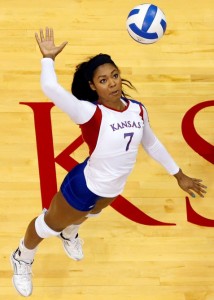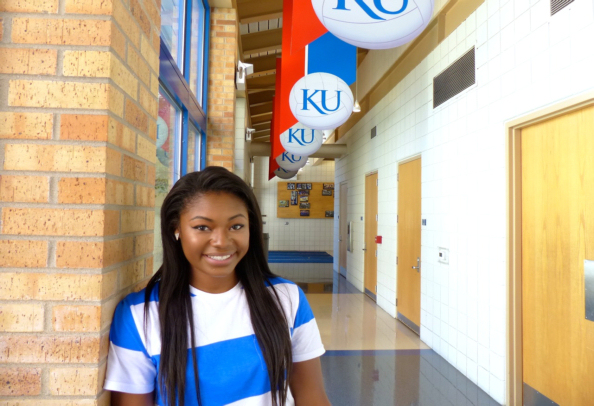Via KU Athletics
Q: Do you ever get the feeling that you’re breaking stereotypes?
A: “I was in seventh grade, I had never played volleyball before and I was the only black girl that was on the team. Next year, no one came back but me. I had racist remarks and the normal stuff against me. I never thought there was an issue with me being on the team. From then on I literally just said, I’m black, so what?”
Q: Has it ever been about race to you?
“I get that it’s a predominantly white-woman sport, but I just never thought of it that way. I just play on the team. If you treat me bad, cool. If you don’t, that’s cool, too. Now I come to college – and from seventh grade to now – you see more black female athletes playing volleyball. Then you have the stereotype that black people they jump higher, they hit harder and they do all of this other stuff. That’s not right, at all! Everyone jumps high, everyone hits hard.”
Q: Have you seen huge strides made in volleyball – or just sports in general?
“It’s interesting to see how different and diverse volleyball is. It shows how anyone can pretty much play. It’s not a one race sport, it’s everyone. If you don’t look at race, and look at skill, it’s all the same. So I never really thought about anything like that. I just play volleyball. I’m passionate about it just like everyone else. But from that time in seventh grade I just never let it bother me because I had other things I had to deal with. I don’t think it was worth my time to listen to or pay attention to. Now I think it’s great in general, how diverse sports have gotten from way back, to now. You see different things. It’s wonderful.”
Q: Do you still have to deal with racist remarks even now?
A: “People joke about certain things, but (they should) think about what they’re saying. It’s funny now, but really think about what you’re saying when you do say it. Now it doesn’t faze me anymore. Everyone plays off everything. It’s based on how good you are, not about what race you are or anything like that. That’s just how I’ve always thought of it.”
 Q: Where did you get your strong outlook on life?
Q: Where did you get your strong outlook on life?
A: “My mom went through the same thing. She lived in New Mexico on the reservation, and she’s part black, too. My grandmother still lives on the reservation. The people on the reservation, or the people she went to school with, would not look at her the same. They would treat her differently because she’s black or Navajo Indian. She went through all of that before, so when I brought it up to her and said some stuff about it she told me how to deal with it. I never came home and cried about it or got angry. I just thought it was stupid. I wanted to have fun and play volleyball. It was good at that age, dealing with everything. Everything comes at you at once sometimes, but I overcame it. This is where I am now.”
Q: I know that you’re really close with your mom and sister, but with your parents divorcing in fifth grade it had to be hard. What was growing up like?
A: “Growing up was different. I decided to move in with my mom and move to a different place, go to a different school, and it was hard at first because I was so young. I had no idea what was going on. I had my little sister, too, and I tried to not make her worry too much about what was going on. Seeing other girls with their whole family and talking about their whole families, and then I go back home and it’s only me and my mom and my sister. That’s hard. But I got over that little part of it and realized it’s not my fault that they’re not together. Then it’s just me, my mom, and my sister. Let’s move forward.”
Q: So you’re 10 and trying to look after your little sister. Do you feel like you had to grow up really fast?
A: “Yeah, growing up in general, my mom worked and my dad played football. My mom worked probably an hour away from where we lived. So I was always home alone with my sister. I had to grow up as soon as I could walk to school myself and to take care of her when my parents weren’t there, pretty much. Football schedules are always so different. Traveling, or going wherever and then my mom would leave at 6:30-7 in the morning and wouldn’t get back until 7 or 8 at night. I feel like that has been a part of me being as mature as I am right now because I had to do it at such a young age. We had babysitters, friends that lived next door to take care of us, but it wasn’t the same. I still had to go back to my house and do it myself. I woke up in the morning by myself, did my hair myself, dressed myself, I had to learn everything pretty much on my own. Go to school, walk back home and just wait.”
Q: Do you think growing up in that setting made you a stronger person?
A: “Now it’s normal. It’s just me my mom and my sister. That’s our family. Growing up was different than the kids I hung out with and it was hard, but I got used to it. Some kids get embarrassed by it, but I never felt that way because it happens, you can’t really do anything about it. I might as well embrace it now. All because of how much my mom did for us from the beginning. Like moving from New Mexico, where she lived all of her life, to Houston. She knew nothing, she didn’t have much money and she didn’t have a job. It went from her not having that much to seeing her work so hard to get where she is now – and to see where she has gotten us now. I don’t get angry about how we grew up, I’m happy we grew up that way.Now we’re so much more appreciative of what we have now because we didn’t have it before.”
Q: Do you ever look back and are amazed at how far you’ve come?
A: “It makes me happy to see my mom happy. Especially because she’s worked so hard to get there. It is funny to talk about sometimes because we had nothing. We had absolutely nothing and came so far. No matter what, my mom always made sure she could get something for us. She always made it happen. Even now with these trips. Club volleyball is like $3,000 dollars, and that’s not including the hotels, trip, and everything. She’s always like ‘I don’t know if we have enough money for this but we’ll get you there!’ And it always happens. She always got us there, we always got what we needed. And she was always okay. That always makes me happy, especially because she had that thought process even when she didn’t have anything. She always knew she was going to be okay. That makes me excited for my own future. I know it’s going to be okay because I’ve watched her do it.”
